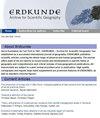葡萄园景观演变的空间格局及其对侵蚀敏感性的影响——20世纪中期以来RUSLE模拟在法国勃艮第墨丘利的应用
IF 1.1
4区 社会学
Q3 GEOGRAPHY
引用次数: 5
摘要
葡萄园的侵蚀敏感性比所有农业活动计算的参考水平高出大约一个数量级,因此防止土壤侵蚀是葡萄园最重要的环境问题之一。由于葡萄园内侵蚀的异质空间模式,空间显式模型对于解决侵蚀易感性和人为实践的共同进化是必要的。在本文中,我们应用RUSLE模型来评估集水区(15平方公里)勃艮第葡萄园(Mercurey)随时间的侵蚀敏感性。该模型首次使用2015-2018年获得的数据进行校准。其次,将前一阶段(1953年和1984年)的侵蚀敏感性与当前参考系进行了比较。这种理论比较认为,C(土地覆盖)和LS(长度斜率)因素都是随着时间的推移而演变的。我们假设,这些因素既揭示了土地利用的演变(尤其是农业土地利用),也揭示了基于使用道路、树篱和沟渠收集沉积物的土壤侵蚀管理策略的发展。目前在集水区范围内计算的侵蚀敏感性参考系约为9152 t.yr-1。20世纪80年代初,随着葡萄园在20世纪下半叶的扩张,侵蚀敏感性达到峰值。据估计,1984年葡萄地块的侵蚀敏感性比当前时期高32%。在20世纪中期,农业土地利用的空间模式(草地和藤蔓的拼凑,适度崎岖的山坡上的藤蔓)导致了适度的侵蚀易感性。在这个阶段,过去的侵蚀敏感性水平估计比当前参考框架低40%。本文章由计算机程序翻译,如有差异,请以英文原文为准。
Spatial patterns of vineyard landscape evolution and their impacts on erosion susceptibility: RUSLE simulation applied in Mercurey (Burgundy, France) since the mid-20th century
Erosion susceptibility in vineyards is approximately one order of magnitude above the reference level calculated for all agricultural activities, and preventing soil erosion is thus one of the most important environmental issues in vineyards. Spatially explicit models are necessary to address the coevolution of erosion susceptibility and anthropogenic practices because of the heterogeneous spatial patterns of erosion within vineyards. In this paper, we apply the RUSLE model to assess erosion susceptibility through time in a Burgundy vineyard (Mercurey) at a catchment scale (15 km²). The model is first calibrated with data acquired in 2015-2018. Second, erosion susceptibility during former stages (1953 and 1984) is compared to current reference frame. Such theoretical comparison considers that both C (land cover) and LS (Length-Slope) factors evolved through time. We hypothesize that such factors reveal both the land use evolution (especially agricultural land uses) and the development of a soil erosion management strategy based on the collection of sediments using roads, hedges and ditches. The current reference frame of erosion susceptibility calculated at catchment scale is about 9,152 t.yr-1. In the early 1980s a peak in erosion susceptibility is concomitant with vineyard expansion during the second half of the 20th century. Erosion susceptibility in vine parcels in 1984 is estimated to be 32% higher than current period. In the mid-20th century the spatial patterns of agricultural land use (patchwork of grasslands and vines, vines on moderately-rugged hillslopes) led to moderate rates of erosion susceptibility. At this stage, past level of erosion susceptibility is estimated to be 40% lower than current reference frame.
求助全文
通过发布文献求助,成功后即可免费获取论文全文。
去求助
来源期刊

Erdkunde
地学-自然地理
CiteScore
2.00
自引率
7.10%
发文量
17
审稿时长
>12 weeks
期刊介绍:
Since foundation by Carl Troll in 1947, ''ERDKUNDE – Archive for Scientific Geography'' has established as a successful international journal of geography. ERDKUNDE publishes scientific articles covering the whole range of physical and human geography. The journal offers state of the art reports on recent trends and developments in specific fields of geography and comprehensive and critical reviews of new geographical publications. All manuscripts are subject to a peer-review procedure prior to publication. High quality cartography and regular large sized supplements are prominent features of ERDKUNDE, as well as standard coloured figures.
 求助内容:
求助内容: 应助结果提醒方式:
应助结果提醒方式:


